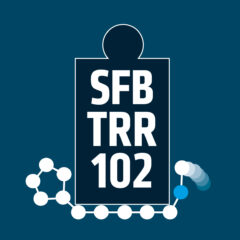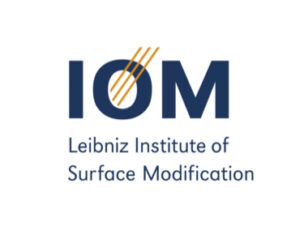Tress
Confining polymers to nanometric sizes often interferes with the characteristic length scales of structure formation and thus significantly alters crystallization or nucleation behavior at the nanoscale. To investigate such effects in nanometric samples, past studies relied either on heavily constraining environments like block copolymer mesophases or on deposited droplets that exhibit significant variation in size thus requiring extensive analysis to assign size classes.
In this project, we developed a novel experimental approach to investigate thermodynamic (and also dynamic) phenomena in aggregates of very small numbers of polymer chains with the potential to examine even individualized macromolecules. For that, a highly specialized setup in dielectric spectroscopy, a nanostructured electrode arrangement, is employed. Despite the tremendous increase in sensitivity that can be achieved, this technique does not enable the detection of single or even a few (macro-) molecules. Consequently, ensembles of individual macromolecules or small aggregates must be measured simultaneously; hence the results, representing the ensemble average, can be interpreted as a conformation average of a single macromolecule (or a small aggregate). To ensure the individual character of all molecules (or aggregates) in the ensemble, the approach is combined with three well-known methods of surface modification which keep each molecule (or aggregate) in its own position: First, gold nanoparticles are deposited on the supporting electrode in a pattern of well-defined size and separation by means of block copolymer micelle lithography (BCML). Second, these surfaces are coated with methyl groups by silanazation, which bond to the silica but not to the gold, to reduce the interaction and prevent chain adsorption. Third, the thus prepared surfaces are exposed to a solution of the macromolecule of interest, which carries a thiol end-group in order to bind chemically to the gold nanoparticles. Thereby, the particle size and the size of the macromolecule controls the average number of molecules attached to a single particle.
This enabled the measurement of poly-caprolactone droplets consisting of 10 chains on average for a relatively small molecular weight (Mw=15kg/mol). In contrast to droplets deposited by spin-casting which demonstrate the sensitivity of this method, the grafted droplets do not crystallize. Apparently, the grafted configuration introduces constraints which suppress crystallization entirely, though it is not clear whether limited chain motion or too wide chain spacing prevent crystallization in the grafted aggregates. In contrast, the results on the spin-cast droplets demonstrate the capability of this approach to examine dynamic and thermodynamic phenomena in droplets consisting of very few polymer chains with prospects nearby to study ensembles of individualized molecules.
Highlighted Publications:
- Wycliffe K. Kipnusu, Martin Tress, and Friedrich Kremer, Glassy Dynamics in Nanometric Confinement of Various Topologies, a Comparison for the Case of Poly(2-vinylpyridine). ACS Symposium Series Chapter 8, 185-201 (2021)
- Martin Tress, Maximillian Vielhauer, Pierre Lutz, Rolf Mülhaupt, Friedrich Kremer, Kunyue Xing, Sirui Ge, Pengfei Cao, Tomonori Saito, and Alexei Sokolov, Polymer Dynamics in Nanostructured Environments: Structure-Property Relations Unraveled by Dielectric Spectroscopy. ACS Symposium Series Chapter 10, 223-238 (2021)
- Jan Philipp Gabriel, Martin Tress, Wilhelm Kossack, Ludwig Popp, Friedrich Kremer, Molecular heterogeneities in the thermal expansivity of polyalcohols. J. Chem. Phys. 154, 024503 (2021)
Other publications of this group:Wing Kit Or, Alaa Youssef Amin Hassan, Martin Tress,Crystallizability of Free and Tethered Chains in Nanometer-Sized DropletsMacromol. Chem. Phys. 224, ...
Read MoreJan Philipp Gabriel, Martin Tress, Wilhelm Kossack, Ludwig Popp, Friedrich Kremer,Molecular heterogeneities in the thermal expansivity of polyalcoholsJ. Chem. Phys ...
Read MoreMartin Tress, Maximillian Vielhauer, Pierre Lutz, Rolf Mülhaupt, Friedrich Kremer, Kunyue Xing, Sirui Ge, Pengfei Cao, Tomonori Saito, and Alexei ...
Read MoreWycliffe K. Kipnusu, Martin Tress, and Friedrich Kremer,Glassy Dynamics in Nanometric Confinement of Various Topologies, a Comparison for the Case ...
Read More






